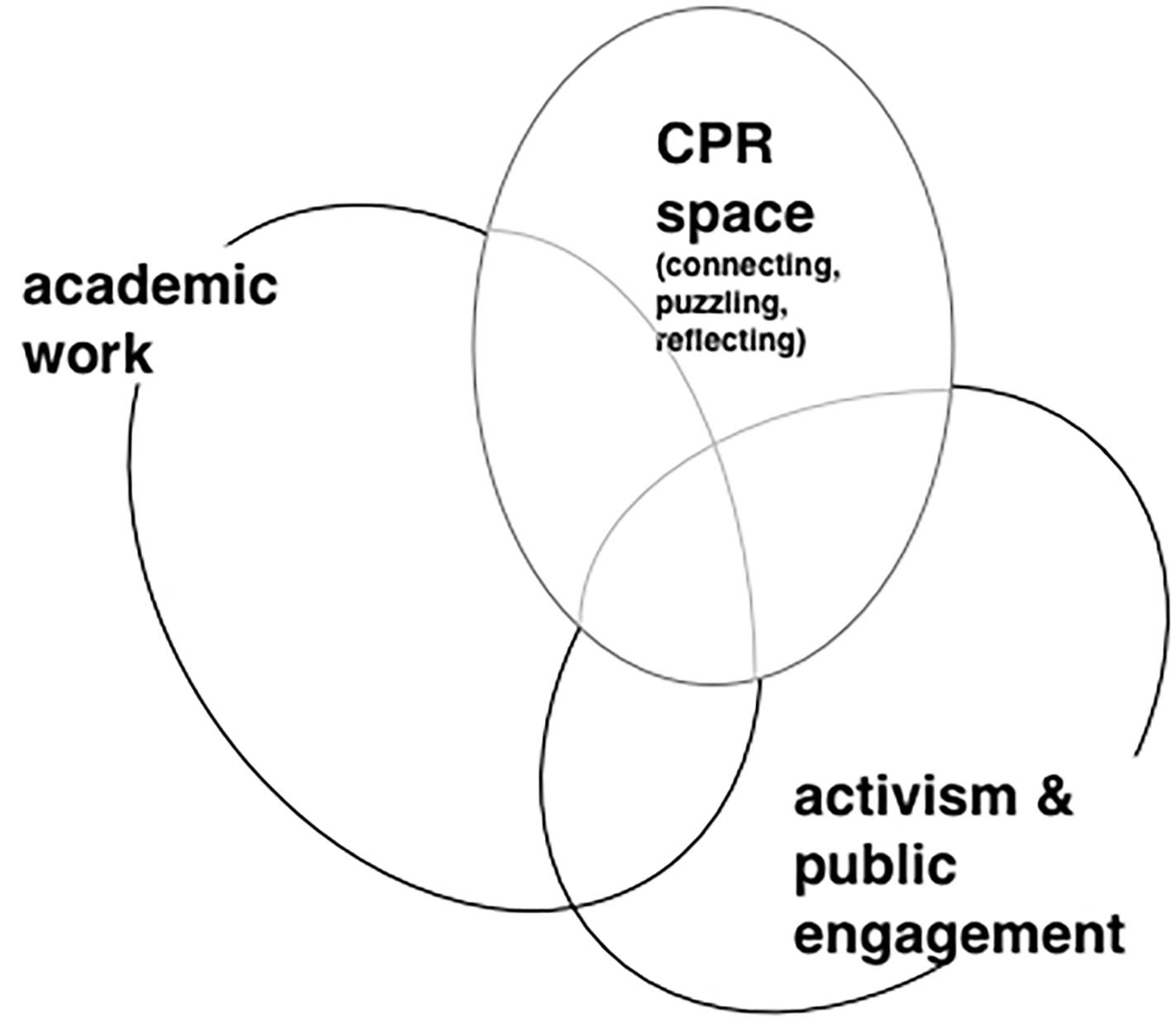CONNECTING-PUZZLING-REFLECTING SPACES
A CPR space is a workshop or learning activity (see examples below) that fosters carryover of outcomes into your work and life in the following manner: The CPR space has a topic that you explore in relation to your individual interests, aspirations, and situations. The exploration makes use of tools and processes, not only for the exploration, but also to develop connections among participants—connections that help you open up and flesh out your contributions, that help you puzzle over ideas and practices until they make more sense—and re-energizes you for engagements back in your workplace and communities.
Contributions to the Topic Derive from Tools and Processes and Connections They Generate
While pursuing the tangible goals of learning and practicing the tools and processes, developing connections, and making contributions on the topic, the experiential goal is that doing so is sufficiently positive that the participants continue afterwards in practicing the tools and processes, sustaining and deepening the connections, putting into practice the contributions to the topic of the CPR space, and drawing support for the latter from the tools, processes, and connections.
Carryover beyond the workshop or learning activity is an issues because the CPR space is a space away from immediate demands of scholarly or activist life, a space where participants can support each other's explorations without having to arrive at a joint contribution to the topic and without obliging themselves to collaborate in extending their product after the end of the workshop or learning space. (The CPR Space is a form of collaboration—and cultivation of oneself and other participants as collaborators [see Cultivating Collaborators]—but not in relation to shaping and undertaking a shared task or project.) In terms of Refractive Practice, CPR spaces provide refraction between the practice that a participant brings to the workshop and the plan they leave with.

CPR spaces allow exploration away from immediate demands of scholarly or activist life
Forms of CPR space include:
4Rs—group processes for, say, a workshop or course, that begin by emphasizing Respect, which enhances Risk taking and consequent insights or Revelations, which leads to Re-engagement.
Collaborative Explorations—structured interactions in small groups over a delimited period of time designed to sustain the face-to-face PBL experience of re-engagement with yourself as an avid learner and inquirer.
CPR workshop—a workshop that moves through the 4Rs over a single day or several days.
Project-Based Learning, in which learners bring diverse interests into their inquiries around problems raised in open-ended scenarios.
Learning Road Trip—arrange a series of visits to people whose work you want to learn more about or, by their responses to you presenting your own work, learn from.
Writing Workshop—using the Five-Phase Format for 30 minutes or an hour to check in on progress and reflect on topics relevant to the stage in the writing project.
Explorations in CPR Spaces are helped by the following tools and processes:
Appreciation that Empowers Others
Autobiographical Introductions with Connections and Extensions Feedback
Cultivating Collaborators
Daily Writing
Definitional Ceremonies
Five-Phase Format dialogue
Freewriting
Online Mindfulness
Plus-Delta Feedback on Work-in-Progress Presentations
Response to Shared Reading
The spirit of a CPR space can be appreciated by considering a relevant alternative, namely, to bring into a group of people who work together tools and processes that they learn or practice as they generate and implement shared plans for action in the workplace or project. Indeed, there are facilitators who warn that running workshops to teach or introduce tools and processes for group work without having a task grounded in shared work is unlikely to be to bear fruit, to result in carryover to participants' work and lives. Is lack of carryover also to be expected for the connections made and for the contributions to the topic—the insight, plans, projects that the participant produces—in the CPR space? Perhaps. Yet, what makes a CPR space attractive to participants is that they re-engage with themselves as avid learners, experience collaboration that does not submerge their individual projects, and get a reminder that it is possible not to continue along previous lines.
Another relevant alternative to the CPR space is the retreat, or series of retreats, in which participants' time together and each person's solitary time is directed at clarifying their direction or vocation (most notably in Circles of Trust following Parker Palmer; Center for Courage and Renewal n.d.). The idea is that once a person has a clear vocation, they should be able to transform their work and life and to sustain that transformation. CPR spaces differ in: a) having a topic that draws together participants so they learn from and provide support on diverse aspects of their projects, not only the deep alignment of inner and outer worlds; and b) the tools and processes used are designed to be readily learned by participants so they can translate them into their own settings to support the inquiries of others—convening or hosting a CPR space is not restricted to certified leaders.
Center for Courage & Renewal (n.d.) “The Circle of Trust Approach.” http://www.couragerenewal.org/approach/ (viewed 17 Oct 2018).